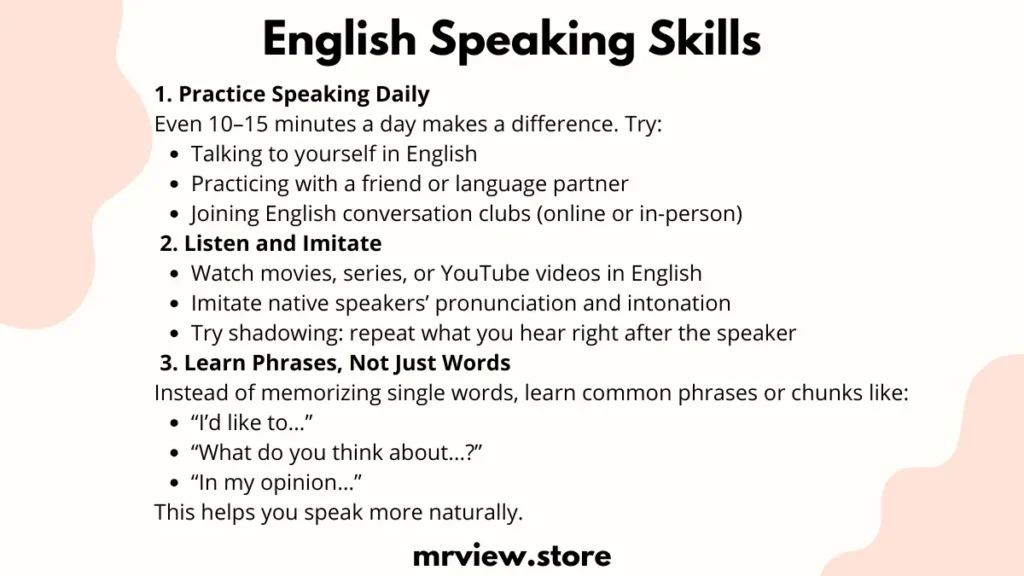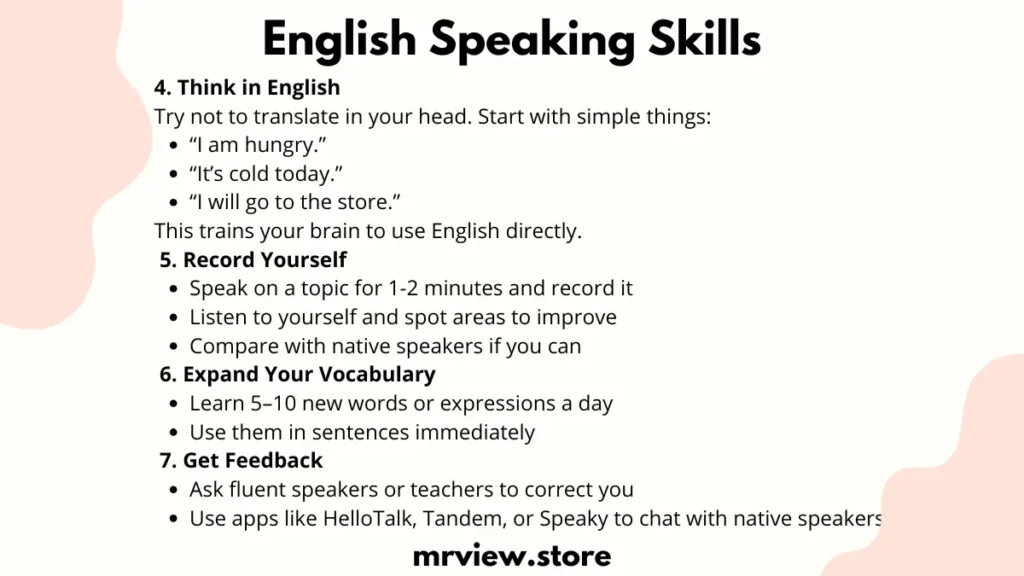Introduction – Why English Speaking Skills Matter
Let’s face it—English is everywhere. From scrolling through social media to watching your favorite series or prepping for that dream job interview, English communication skills have become absolutely essential. But here’s the catch: getting really good at speaking English doesn’t happen by chance—it takes focus, the right strategies, and consistent practice.
That’s where this guide swoops in. It’s designed not just to teach you how to speak English, but how to truly unlock your speaking potential. Yep, we’re talking about fluency, confidence, clear pronunciation, and the kind of vocabulary that helps you sound natural and expressive.
In this multi-part article, you’ll discover:
- Real-world tips to overcome the fear of speaking,
- Smart ways to expand your vocabulary without boring memorization,
- Pronunciation tricks to make your speech crystal clear,
- AI tools and tech that’ll boost your learning speed,
- And of course, how to stay motivated on your journey to English fluency.
By the end of this, you’ll be armed with powerful strategies to take your English speaking from shaky to strong—and maybe even fluent. Let’s dive in!
Understanding the Importance of English Speaking Skills
1.1 Why English Speaking Is More Than Just Grammar
You can memorize grammar rules till your brain begs for a break, but let’s be honest—speaking English well is a whole different ball game. Communication isn’t just about knowing the rules—it’s about using them, on the spot, naturally. Whether you’re traveling, job-hunting, or making global connections online, being able to express yourself in English is a skill that opens up tons of doors.
And here’s a fun fact: English is spoken by over 1.5 billion people worldwide, making it a global connector. It’s the common ground in international business, education, technology, and pop culture. No wonder everyone’s aiming to get better at it!
1.2 How Speaking English Boosts Your Confidence
Being able to speak confidently changes everything. You actually enjoy conversations. You shine in interviews, discussions, even casual chats. That confidence boost spills into other areas of your life too—your mindset, your goals, and how others see you.
So, learning to speak English fluently isn’t just a language goal—it’s a life upgrade. It’s about unlocking your potential, building your voice, and showing up in the world with clarity and strength.
Break the Fear – Overcoming the Anxiety of Speaking English

2.1 Why Are You Afraid to Speak English?
Let’s be real—speaking English out loud can feel terrifying. Your hands sweat, your mind blanks out, and suddenly, every word you knew vanishes like smoke. But guess what? That’s not because you’re bad at English. It’s because you’re human.
Most learners feel this anxiety. The fear of mispronouncing words, making grammar mistakes, or just sounding silly in front of others is all too common. But here’s the thing—those mistakes? They’re part of learning. No one ever got fluent by staying silent.
In fact, even native speakers mess up! The key isn’t perfection—it’s progress.
2.2 How to Build Speaking Confidence Step by Step
So, how do you move past the nerves and start actually speaking with confidence? Well, it doesn’t happen overnight, but it can happen faster than you think.
- Start Small: Talk to yourself in English. Narrate what you’re doing—“I’m brushing my teeth,” “I’m opening the fridge.” Sounds silly, but it trains your brain to think in English.
- Practice in Safe Spaces: Find a buddy, tutor, or online language partner who’s patient and encouraging. Apps like Tandem are perfect for finding conversation partners from around the world.
- Use the Mirror Trick: Stand in front of the mirror and practice common phrases or daily conversations. Seeing yourself speak builds confidence like magic.
- Celebrate Mistakes: Every mistake is a sign you’re trying. Own it. Learn from it. Move on.
2.3 Rewire Your Mindset with Positive Self-Talk
Your brain believes what you tell it. If you constantly say, “I suck at speaking,” guess what? Your brain will agree. Instead, flip the script. Try phrases like:
- “Every day, I’m getting better at English.”
- “It’s okay to make mistakes—I’m learning.”
- “Speaking out loud helps me grow.”
With repetition, this kind of positive self-talk shifts your confidence—and your results.
2.4 Real Stories, Real Progress
Just for motivation, let’s peek at people who once struggled with English but now speak fluently. Many shared that their turning point came when they stopped being afraid of making errors. Once they embraced communication over perfection, they started improving—fast.
It’s not about speaking perfect English; it’s about speaking bravely.
Daily Practice that Works – Build Habits, Not Pressure
3.1 The Power of Consistency Over Perfection
Here’s a little truth bomb—consistency beats intensity. You don’t need to spend hours buried in textbooks. Instead, short, regular bursts of English each day will do the trick.
Think about it. Would you rather do a 2-hour workout once a week or 15 minutes daily? The same idea applies to your English. Just 15–30 minutes a day can skyrocket your fluency over time.
And the best part? You can make it part of your routine, without stress.
3.2 Create a Realistic Daily English Routine
A routine doesn’t mean boring. In fact, you can build your practice into fun daily habits:
- Morning: Read an English quote or listen to a short podcast while brushing your teeth.
- Afternoon: Text a friend in English or write your to-do list using English verbs.
- Evening: Watch a short YouTube video with English subtitles (and maybe repeat sentences aloud).
Need some help staying consistent? Try the BBC Learning English site—it’s packed with daily audio, video, and vocabulary tools for every level.
3.3 Microlearning: Your Secret Weapon
Ever heard of microlearning? It’s a fancy term for learning in small, bite-sized chunks. Why does it work?
Because your brain absorbs and remembers better when it’s not overwhelmed. Here’s how you can use it:
- Learn 3 new words a day.
- Focus on 1 grammar rule at a time.
- Practice 1 real-life scenario (like ordering food) per week.
Bit by bit, it all adds up—and fast.
3.4 Track Your Progress and Stay Motivated
It’s easy to feel like you’re not improving, even when you are. That’s why tracking your progress is a game-changer.
Use a notebook or app to note:
- New words you learned
- Phrases you practiced
- Mistakes you corrected
- Confidence level from 1 to 10
Seeing your wins builds motivation. Plus, it helps you focus on what really works for you.
Active Listening – Train Your Ears Like a Native
4.1 Why Listening Is the Secret Sauce to Speaking
Let’s face it—you can’t speak what you can’t hear. Think of listening as the foundation of real fluency. The more you expose yourself to how real people speak English, the easier it is to absorb natural rhythm, slang, intonation, and pronunciation.
Passive listening (like having a podcast on in the background) is helpful, sure. But active listening? That’s where the magic happens.
4.2 What Is Active Listening (And How to Do It Right)?
Active listening means paying close attention to how something is said—not just what is said. Try this simple method:
- Choose a short clip (1–3 minutes).
- Listen once without subtitles.
- Listen again with subtitles.
- Repeat key phrases aloud.
- Write down new vocabulary or grammar structures.

This technique boosts your understanding, pronunciation, and vocabulary—all at once.
💡 Pro tip: YouTube channels like EnglishClass101 offer short, focused listening lessons made for learners just like you.
4.3 Use English Audio Daily—Without Changing Your Lifestyle
Good news: You don’t need to change your whole schedule to get your ears tuned to English. Here’s how to sneak listening practice into your everyday routine:
- While walking: Listen to a podcast like Luke’s English Podcast or The English We Speak.
- While cleaning: Play English audiobooks or TED Talks.
- Before bed: Watch 5 minutes of an English video, even if it’s just funny clips or short news.
Even 10 minutes a day can sharpen your ear and boost your speaking confidence over time.
4.4 Shadowing: Mimic Your Way to Better Fluency
“Shadowing” might sound like something from a spy movie, but it’s actually a killer technique to improve fluency.
Here’s how it works:
- Pick a sentence or phrase from a native speaker.
- Play it back and immediately repeat it aloud, matching speed, tone, and pronunciation.
- Don’t pause or stop the audio—just keep going like an echo.
It feels weird at first, but this method helps you think in English and speak more naturally.
Grammar Without the Headache – Speak Correctly with Confidence
5.1 Is Perfect Grammar Really Necessary?
Well, here’s the truth: you don’t need perfect grammar to speak English fluently. Seriously! Most native speakers don’t speak in flawless grammar all the time. What really matters is being understood clearly and confidently.
That said, mastering basic English grammar gives you a solid foundation. It helps your sentences make sense and keeps miscommunication at bay.
Think of grammar as the glue that holds your words together—important, but not something to stress over every minute.
5.2 Focus on Core Grammar Structures First
Forget memorizing endless rules. Instead, master these essential grammar patterns:
- Simple tenses (Present, Past, Future): “I eat,” “I ate,” “I will eat”.
- Modal verbs (can, should, might): “I can speak English,” “You should practice.”
- Prepositions (in, on, at): “I live in Paris,” “I’ll see you on Monday.”
- Question forms: “Where are you from?” “What do you do?”
These are the patterns you’ll use every day in real conversations.
If you’re unsure about where to start, BBC Learning English’s Grammar is a goldmine of clear, quick lessons.
5.3 Practice Grammar in Real-Life Contexts
Here’s the kicker: You learn grammar faster when you use it. Don’t just fill out grammar worksheets—try these practical tips:
- Write daily journal entries in English.
- Speak aloud and describe your day using different tenses.
- Chat with a language partner and focus on using new grammar rules naturally.
When grammar becomes a part of your daily speaking practice, it sticks without the stress.
5.4 Don’t Be Afraid to Make Mistakes
Let’s get one thing straight: mistakes are proof that you’re learning. Every fluent English speaker made hundreds of grammar errors along the way.
Instead of freezing up, say what you want to say. Then later, reflect and refine.
You don’t need to wait for perfection. You just need to keep going.
Supercharge Your Vocabulary – Speak with Precision and Style
6.1 Why Vocabulary Matters for Fluent Speaking
Let’s face it—words are your tools. The more you have in your mental toolbox, the easier it is to express yourself. But hey, it’s not about stuffing your brain with fancy words you’ll never use. It’s about smart vocabulary building.
Want to sound fluent and natural? Focus on words that come up in real conversations—daily routines, feelings, common topics like food, travel, and work. That’s the vocab that makes the real difference.
6.2 Use the 80/20 Rule for Learning Words
Here’s a game-changer: The 80/20 rule. Basically, 20% of English words are used 80% of the time.
So, learn those high-frequency words first! Things like:
- Phrasal verbs: get up, look after, turn on
- Useful adjectives: easy, important, tired
- Daily verbs: go, do, make, say
Master these, and you’ll sound fluent faster than you ever imagined.
You can even check out curated lists from Oxford’s 3000 Core Words to stay focused on what really matters.
6.3 Create a Vocabulary Journal (and Actually Use It)
Learning a new word and forgetting it five minutes later? Ugh—we’ve all been there. That’s why a vocabulary journal is your secret weapon.
Here’s how to do it right:
- Write down the new word
- Include its definition, an example sentence, and a quick sketch or emoji to make it stick
- Review it every few days, and use it in your speaking or writing
Pro tip: group words by topic (like “Shopping,” “Emotions,” “Job Interviews”) to make recall easier and faster.
6.4 Don’t Learn Words in Isolation – Use Them!
Learning vocab in context is like giving your brain a GPS for remembering words. Instead of memorizing “apple = elma,” try:
- “I ate a red apple after lunch.”
- “Apples are my favorite fruit because they’re crunchy.”
Watch movies, read blog posts, or listen to podcasts. Notice how words are used, and then try using them the same way in your own sentences.
Oh, and don’t forget to revisit old words too! Spaced repetition tools like Anki or Quizlet can do wonders here.
Think in English – Break the Mental Barrier
7.1 Stop Translating in Your Head – Start Thinking in English
Ever get stuck mid-sentence because you’re translating word by word from your native language? Yep, that’s a huge fluency killer. The trick is to train your brain to think directly in English.
This isn’t some magical gift—it’s a skill. And like any skill, it gets easier with practice.
Start small:
- When you’re alone, describe what you’re doing: “I’m brushing my teeth,” or “I’m walking to school.”
- Look around and name objects in English: “chair, window, laptop”
- Ask yourself questions and answer them in English: “What do I want to eat?” “Maybe a sandwich.”
Before you know it, English becomes your default thought language—and that’s fluency gold.
7.2 Use Mental Rehearsal for Real Conversations
Let’s say you have a job interview or a trip abroad coming up. Instead of stressing, rehearse the possible conversations in your head.
For example:
“Hi, I’m here for the interview.” “Sure, I’ve worked on similar projects before.”
This technique is used by athletes, performers—and now, you. Practicing mentally gives you a head start when real life kicks in.
7.3 Label Your Environment in English
Want a fun and visual way to make English part of your everyday life? Start labeling things around your house with sticky notes.
- Mirror 🪞
- Door 🚪
- Refrigerator ❄️
Seeing those words regularly cements them into your memory. Plus, it’s a great trick to immerse yourself without traveling.
7.4 Surround Yourself with English – Even When You’re Not Studying
You don’t need to be actively studying to improve. In fact, passive learning is super powerful when you’re consistent.
Here’s how to stay immersed:
- Change your phone and social media language to English
- Listen to English music, podcasts, and YouTube videos daily
- Follow English-speaking content creators on TikTok, Instagram, or X (formerly Twitter)
Need somewhere to start? The BBC Learning English platform has bite-sized lessons that fit perfectly into your day.
By building this immersive environment, you’ll unlock natural fluency—and honestly, you’ll barely notice you’re learning.
FAQs
1. How can I improve my English speaking skills fast?
To improve your English speaking skills quickly, focus on daily practice. Speak with native speakers, use language exchange apps like Tandem or HelloTalk, think in English, and immerse yourself in the language through videos, podcasts, and books. Consistency is key!
2. What is the fastest way to become fluent in English?
The fastest way to become fluent is by combining active and passive learning. Practice speaking every day, listen to English content, read aloud, and surround yourself with English. Thinking in English and joining conversation clubs also help boost fluency.
3. Can I learn to speak English without grammar?
Yes, you can speak basic English without deep grammar knowledge. However, understanding grammar rules makes you sound more natural and helps you communicate complex ideas. Start with simple grammar and build up over time.
4. How long does it take to speak English fluently?
It varies, but with focused daily practice, you could reach conversational fluency in 6–12 months. It depends on your current level, learning methods, and how often you practice speaking and listening.
5. Is it possible to learn English by myself?
Absolutely! Many learners reach fluency through self-study. Use resources like YouTube, English apps, podcasts, and online courses. Pair self-study with speaking practice using language partners or AI chat tools for faster results.
6. How do I overcome the fear of speaking English?
To overcome fear, start by speaking in low-pressure settings. Talk to yourself, record your voice, or chat with friendly language partners. The more you practice, the more confident you’ll become.
Conclusion
Unlocking your English speaking potential isn’t just a dream — it’s a journey that starts with small steps and consistent effort. Whether you’re mastering pronunciation, boosting your vocabulary, or practicing with native speakers, every moment counts.
Remember, fluency doesn’t happen overnight. But with the right methods, mindset, and motivation, you’ll speak confidently, clearly, and naturally in no time. Don’t be afraid to make mistakes — they’re stepping stones to success. Surround yourself with English, stay curious, and keep pushing past your comfort zone.
So go ahead — start a conversation, join an online group, shadow your favorite movie lines, or journal in English today. The more you speak, the better you get.
Your fluent, confident self is just around the corner — and the world’s waiting to hear you speak.
